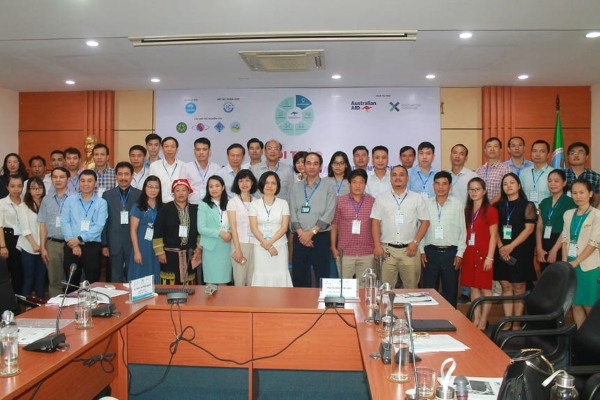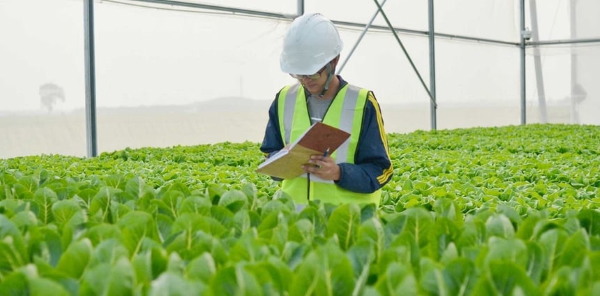The formation and promotion of cooperatives and enterprises and research institutes to actively participate in the Innovation Club will help cooperatives and enterprises sharing, receiving, applying and actively innovating & creating products, useful solutions, then continuously developing forward…
by Chu Khôi
On October 6, at the Vietnam Academy of Agricultural Sciences (VAAS), the launching ceremony of the Innovation Club for cooperatives and small and medium enterprises (SMEs) in the horticulture industry (HCIC) was held, attracting the participation of a large number of cooperatives and small businesses coming from many different provinces.
This event was organized by VAAS in collaboration with the Aus4Innovation Program – The Commonwealth Scientific and Industrial Research Organisation (CSIRO).

The value is not high due to the low scientific content
Assoc.Prof.Dr. Dao The Anh, Vice President of VAAS, shared that at present, many cooperatives and enterprises have voluntarily formed an agricultural production chain. They have realized that developing value chains will help improve market access, increase product value, thereby minimizing the “emergency rescue” scenario of agricultural products.
However, most of the agricultural product chains still operate with low efficiency due to high transaction costs, low processing technology, and not applying scientific and technical advances to production.
“Cooperatives and small businesses are facing many difficulties and challenges when investing in horticulture production. That is, there is no synchronous infrastructure system, lack of major hubs to sell and introduce products. Information technology has not been effectively applied in the production process. There has not been a close connection between cooperatives and scientists for scientists to research varieties and production technical progress according to the orders of cooperatives”, Assoc. Prof. Dr. Dao The Anh said.
Ms. Tran Huong Giang, Scientific commercialization cooperation manager under the Australian Embassy A4Innovation Program, said that A4Innovation aims to support and promote innovation connections in Vietnam. The A4Innovation Program with a budget of AU $11 million, funded by a non-refundable fund, will be implemented from 2018 to 2022. Project partners include: Ministry of Science and Technology of Vietnam, Research Organization Australian studies and industry, Vietnamese and Australian research institutes and universities.
Before launching in Vietnam, an Innovation Program in manufacturing industry was also launched in Australia. Since September 2014 up to now, there have been 1,375 businesses in Australia using 1,412 services to promote innovation and connection. Before joining the program, 86% of firms said they had never worked with researching and that they urgently needed to develop industry relationships. Up to now, 94% of participating businesses said that they were satisfied with the results of the project, they have been connected with research institutes, scientists to be transferred to technical advances.

The horticulture industry has great potential for innovation
Assoc. Prof. Dr. Dang Van Dong, Deputy Director of the Fruit and Vegetable Research Institute (under VAAS), said that the fruit and vegetable sector currently accounts for 12% of the output value (in monetary terms) and 10% of annual export value. Vietnam has exported fruit and vegetable products to nearly 60 countries around the world, with export turnover in 2019 reaching approximately 4 billion USD and continuously increasing, the following year being 10-20% higher than the previous year. Vietnam has joined many bilateral and multilateral trade agreements to help Vietnamese vegetables and fruits be sold more widely in the international market.
The fruit and vegetable industry accounts for 8% of the cultivated area of agricultural crops, but creates jobs for 18% of workers in agriculture, about 4 million people with high and stable incomes. Vietnam has very rich plant genetic resources, from which it is possible to select many varieties and varieties of specialty fruit trees, vegetables and flowers that are not available in other countries and territories.
Many fruit and vegetable products of Vietnam have built geographical indications and have reputable brands in domestic and international markets. Vietnam has had a policy to allow the conversion of inefficient rice production areas to the production of highly economically efficient crops, thus facilitating the development of concentrated fruit and vegetable production areas. Supply of raw materials for fresh export or export processing.
In recent years, many scientific and technical advances have been transferred to cooperatives and small businesses producing vegetables, such as: grafting young fruits for pomelo branches; pruning branches for longan flowers; additional pollination for the plant; pods for fruit trees; growing vegetables in membrane houses; growing sprouts; hydroponic vegetable cultivation; growing melon without using land; growing vegetables with pasline arrays; using tissue culture technology; control system of temperature, humidity for flowers…
Mr. Dong said that many technical advances in scientific research institutes are very promising to transfer to cooperatives and small businesses. Especially the application of information technology in operating, managing production and selling products.
“Therefore, it is necessary to strengthen cooperation links between cooperatives with managers, scientists, enterprises to create product value chains. The formation and promotion of cooperatives and enterprises, research institutes actively participating in HCIC will help cooperatives and businesses always share, receive, apply and actively innovate and create products, useful solutions, thereby constantly developing“, Mr. Dong emphasized.
Dr. Hoang Thanh Tung, VAAS representative said, HCIC was established to connect scientific researchers with cooperatives and SMEs in order to make policies to support investment in start-ups and public transfers. new technology in the fruit and vegetable industry. Thereby, creating a forum to share information about new technologies, opportunities for cooperation, business, commercialization of new technologies, and enhance the competitiveness of members. The club also aims to create a database of innovative technologies and facilitate the transfer and commercialization of new technologies for club members.
HCIC is organized and operates on the principles of voluntary, autonomous, self-balancing, and compliance with the laws of the State; respect for the rights and legitimate interests of club members.
For more information: Netherlands Vietnam Horti Business Platform
Netherlands Vietnam Horti Business Platform
Ms. Mai Hong – Coordinator Vietnam
info@nvhortiplatform.com
+84 90 341 6983
Ms. Mirjam Boekestijn – Coordinator the Netherlands
info@nvhortiplatform.com
+31 6 25 27 60 71
www.nvhortiplatform.com
